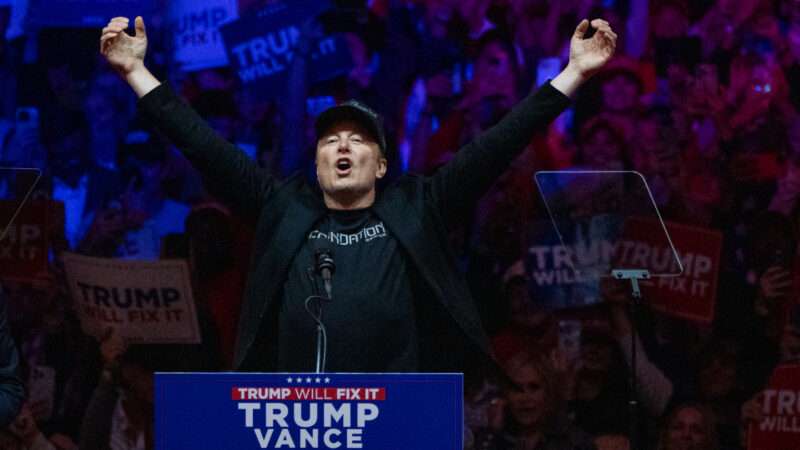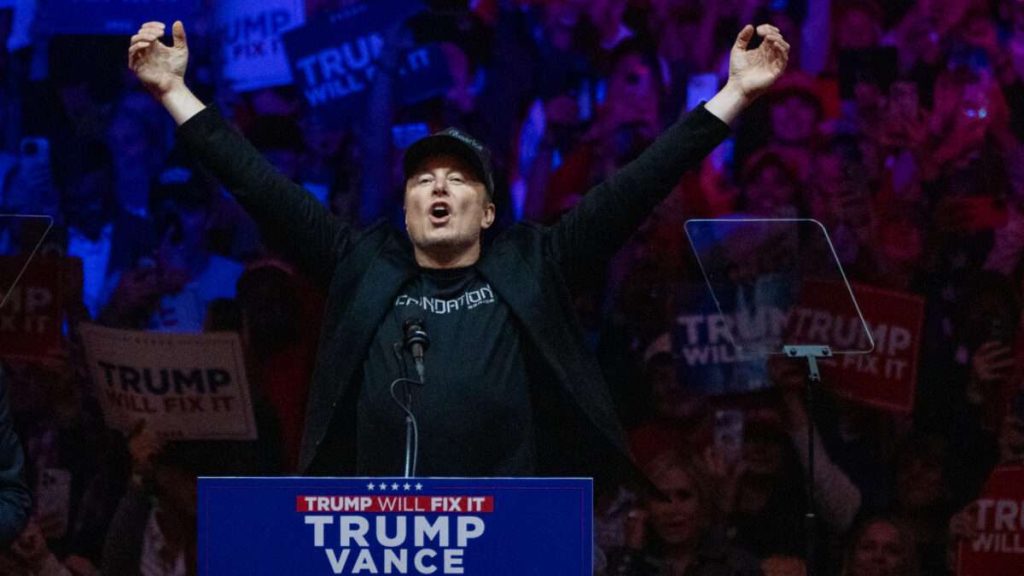
President-elect Donald Trump’s new Department of Government Efficiency (DOGE) is getting a lot of buzz, much of it tentatively hopeful. There’s a good reason for that: Untested though it is, the idea of handing responsibility for dismantling government bureaucracy, slashing excess regulations, and cutting wasteful expenditures to a couple of wealthy tech bros might work where nothing else has. Given that the federal government hasn’t balanced its books in decades and the budget deficit just keeps growing and adding to the national debt, it might be our only hope of avoiding catastrophe.
A $1.8 Trillion Deficit, and Growing
“In fiscal year 2024, which ended on September 30, the federal budget deficit totaled $1.8 trillion—an increase of $138 billion (or 8 percent) from the shortfall recorded in the previous year,” reports the Congressional Budget Office.
If that sounds familiar, it should. You’ve heard something similar before, year after year, though the numbers tend to become increasingly dire as time goes on. It’s been a very long time since the federal government managed to confine its spending to what it takes in.
“In the last 50 years, the federal government budget has run a surplus four times, most recently in 2001,” the U.S. Treasury cheerfully concedes on its national deficit explainer page. In fact, since the start of fiscal year 2025—which began, let’s remember, last month—”the federal government has spent $257 billion more than it has collected.” That’s $191 billion more than the roughly $67 billion deficit our federal government had run up by this time last year.
The Federal Reserve Bank of St. Louis puts annual deficits in graph form for easy viewing. Even if you ignore the insanity of pandemic year 2020’s spending and deficit, there’s a steady widening of the gap between revenues and expenditures over the last decade.
A Spending Problem Crying for an Intervention
What’s especially impressive, for a certain value of “impressive,” is that federal revenues were up by 11 percent, or $479 billion, from 2023. That $1.8 trillion deficit was accomplished by increasing spending by dramatically more than the rise in revenues: $617 billion. It seems that no matter how much money the U.S. government collects, it spends more.
If the federal government were a shopaholic family member, we’d have held an intervention years ago. Maybe—and here’s where tentative hopefulness comes in—a pair of wealthy tech entrepreneurs can stage the intervention that the federal government so obviously needs.
“I am pleased to announce that the Great Elon Musk, working in conjunction with American Patriot Vivek Ramaswamy, will lead the Department of Government Efficiency (‘DOGE’),” President-elect Trump announced November 12 on the Truth Social platform. “Together, these two wonderful Americans will pave the way for my Administration to dismantle Government Bureaucracy, slash excess regulations, cut wasteful expenditures, and restructure Federal Agencies.”
Trump specified that “to drive this kind of drastic change, the Department of Government Efficiency will provide advice and guidance from outside of Government.”
That means that DOGE—and yes, you have to wonder if we’re being pranked given Musk’s connection to dogecoin—won’t have any power to actually enforce its will. It will just counsel the president and those inside government on potential improvements in efficiency and cuts in spending and waste. But working outside the government means DOGE, Musk, and Ramaswamy are also freed from the government way of doing things, with all its red tape and bureaucracy.
“All actions of the Department of Government Efficiency will be posted online for maximum transparency,” Elon Musk posted on X. “Anytime the public thinks we are cutting something important or not cutting something wasteful, just let us know! We will also have a leaderboard for most insanely dumb spending of your tax dollars. This will be both extremely tragic and extremely entertaining.”
In October, Musk insisted “at least $2 trillion” could be cut from the federal budget. That suggests he’s not interested in just trimming a bit at the margins or slightly slowing the rate of Leviathan’s growth.
Chances Are Slim, but What Are the Alternatives?
Can DOGE work? If I were a betting man, and I am, I’d say there’s no chance in Hell. Without the power to enforce its will, the most sincere and ambitious DOGE recommendations will run up against the complete lack of political will in Washington, D.C. to tackle the cost of financially unsustainable entitlement programs, such as Medicare and Social Security, and national defense—programs which make up the majority of the budget. That will allow net interest on the debt the federal government has already run up to consume an ever-growing portion of the federal budget until there’s nothing else.
But what other option is there? The Democratic and Republican party platforms both promise to “protect” Social Security and Medicare, and boast of their commitment to a “bigger” military (Republicans) and “historic investments in America’s military industrial base” (Democrats). That doesn’t leave much room for reining in spending through normal legislative channels. And the stakes are high.
Failure Would Be ‘Cataclysmic’
“Under current policy, the United States has about 20 years for corrective action after which no amount of future tax increases or spending cuts could avoid the government defaulting on its debt whether explicitly or implicitly,” economists Jagadeesh Gokhale and Kent Smetters wrote for the Penn Wharton Budget Model last year. They added that this is the “best case” scenario and the window for balancing the federal government’s books could dramatically shrink if people lose faith that the U.S. government will ever address its excesses.
If the U.S. government defaulted, Moody’s Analytics concluded, “the blow to the economy would be cataclysmic.” The dollar would lose value, financial markets would fall “wiping out $10 trillion in household wealth,” jobs and businesses would be lost, prosperity would plunge, and…it would be bad.
So, even if the likelihood of DOGE, under the guidance of Musk and Ramaswamy, succeeding in making the federal government remotely affordable is slim, it might be our best hope. A rotating cast of lawmakers and presidents let spending outpace revenue for decades and show absolutely no interest in changing their habits. Maybe—just maybe—outsiders can get it done.
It will certainly be interesting watching them try.
The post DOGE’s Chances Are Slim, but It Might Be Our Only Hope appeared first on Reason.com.






